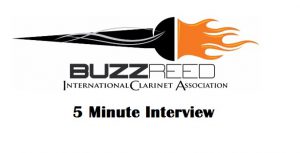
Ask BuzzReed User Submission:
At the school where I teach private lessons, I find parents are often nervous for their son or daughter trying out the clarinet and there is a lot of pressure that comes with that! I get questions like “does my son have the right shaped mouth for the clarinet?” or “do you think she has potential for the clarinet?” And if the student is not able to produce an even tone on the very first lesson, I’d appreciate advice on how to keep the student (and parent) excited and engaged. Beginner’s luck in a first lesson before the student has time to practice can be so variable and I try to express that to both parents and students, but I feel that this pressure can be discouraging to new clarinet students. Help!
Answer: By Jennifer Zimmerer
Before a student commits to private clarinet lessons, I think it is important that they have a clarinet trial through their school band program, or from you, the private instructor. One school where I teach lessons has an instrument fitting day where all beginning band students have an opportunity to try flute, clarinet, trumpet, and trombone. They will get a short one-on-one session with a director or lesson teacher where they have a chance to make their first sound on all four instruments. In my experience, almost all students can get a strong sound on the mouthpiece and barrel of the clarinet within a couple of minutes. There are of course some who have difficulty with embouchure or try to bite down too much, but most are very successful. Then I put the instrument together, turning the barrel around backwards so I am doing fingerings and the student is just focused on setting up an appropriate embouchure and blowing steady air. If I can finger through low notes, press the register key, and get up above the staff while they are blowing, this student almost certainly has enough of a beginning concept to study clarinet.
If the band does not provide this opportunity for students, you can do this yourself in a few short minutes (even in front of parents) to test a student’s aptitude before taking them on in lessons. You might advertise this as a free clarinet trial and schedule it before/after your regular lessons so you are only losing about 10 minutes of your time and one clarinet reed. You can use a quality beginner mouthpiece and 2.5 reed on your clarinet and have the parent sit in on this first session if they wish. When the student makes that first sound and then hears you finger through more of the range, they will be excited to get started and you will have the parent’s buy-in as well.
I find that students can work through most physiological obstacles on clarinet. The bite (over/under/crossbite) will change their playing angle slightly, but apart from severe dental issues, most students can play clarinet successfully. As far as wind instruments go, there is not a huge limitation for braces on clarinet. For my students, their success with forming an embouchure has more to do with their mental and visual concept of what an appropriate embouchure looks and feels like, as well as being able to control their muscles. If you have a student who tries clarinet for the first time and simply can’t control the way they put the mouthpiece in their mouth, you will probably find that other wind instruments will be equally challenging for them. This does not mean they are unteachable, but they will certainly need more time and instruction on embouchure and tone production. Reassure parents that you tailor each lesson to a student’s specific needs and if the student is willing to put in the time, you will help them to be successful. If in the end it is too challenging for them, don’t be afraid to be up front with parents about the student’s progress.
To keep enthusiasm alive, it is important to set your young student up for success by moving methodically through early lessons. I spend a lot of time on mouthpiece and barrel for tone and pitch development. Good equipment is also crucial. A good quality mouthpiece will solve so many beginner frustrations. Encourage parents who register beginners for lessons to be prepared to commit to a quality plastic clarinet (purchase or rental), mouthpiece, ligature, and reeds. This investment up front will make early lessons so much more enjoyable.

Comments are closed.